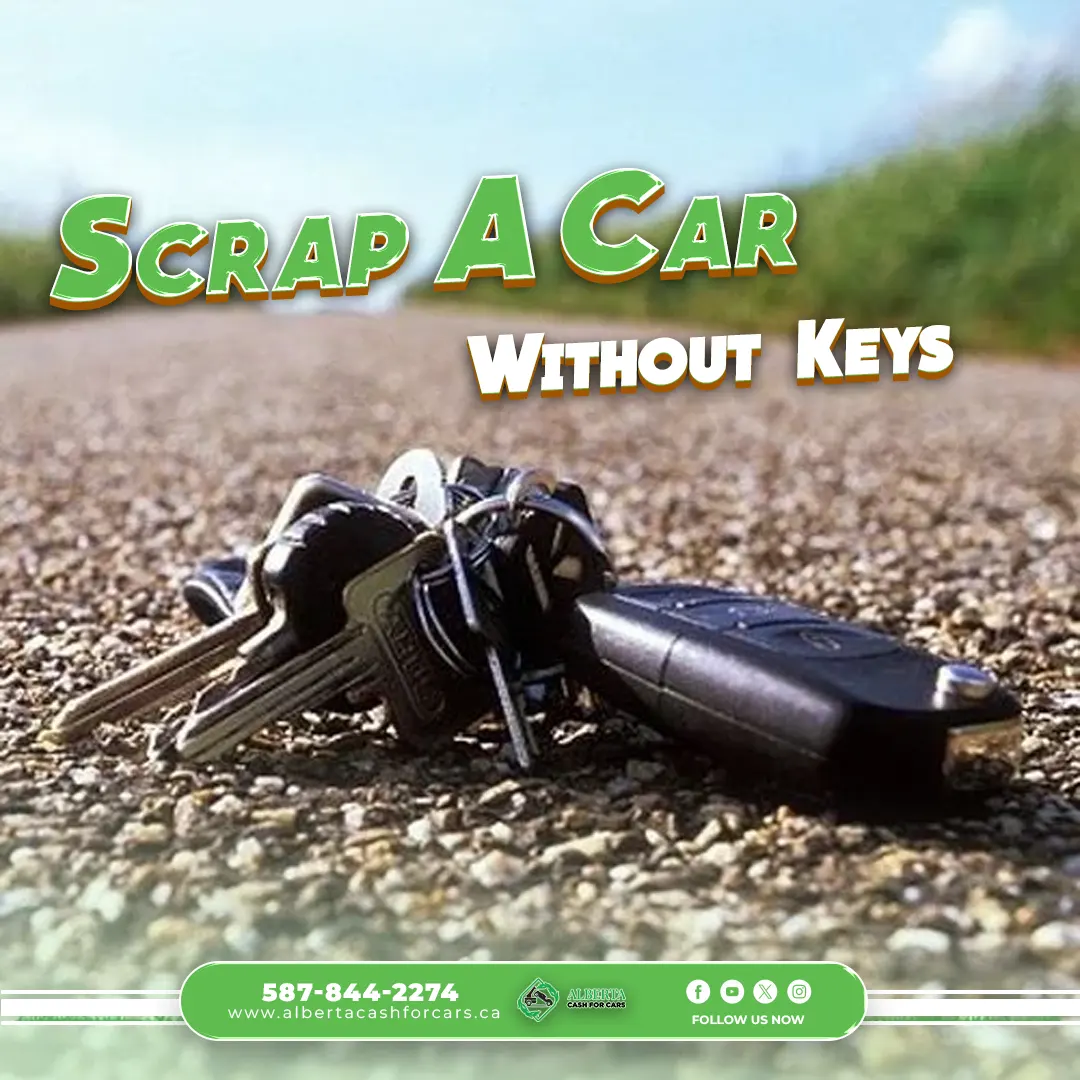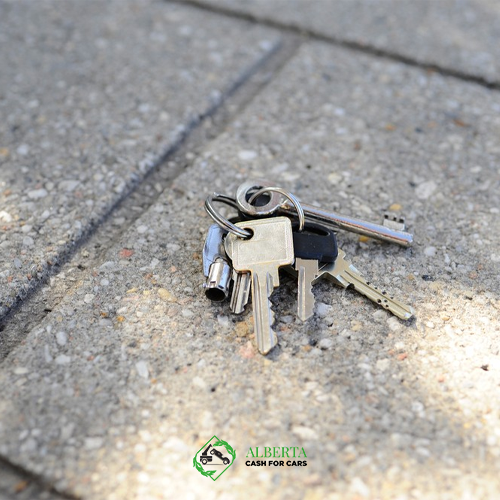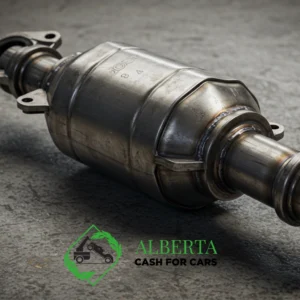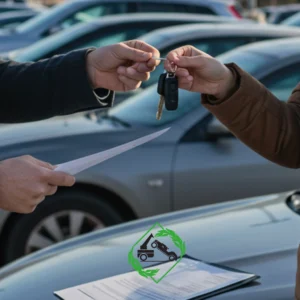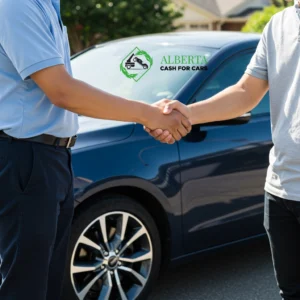Finding yourself in possession of a scrap a car without keys presents challenges. Perhaps you inherited a vehicle but can’t find the keys. Or an old car stopped working and now blocks space needed for a new vehicle. Regardless of how it happened, scrapping a car without keys requires special considerations around ownership, entry, regulations, valuation, and documentation. This article at Cash for cars Calgary covers techniques and best practices for legally scrapping an inoperable vehicle to which you can’t gain keyed entry.
No Hassle, Just Cash — Book Your Free Pickup or Quote Today!
The Responsibility of Car Disposal
Car disposal isn’t just about getting rid of a vehicle; it’s about doing it responsibly. Automobiles are composed of a variety of materials, some of which can be harmful to the environment if not disposed of properly. In this guide, we’ll emphasize the importance of environmentally friendly and legally compliant car disposal.
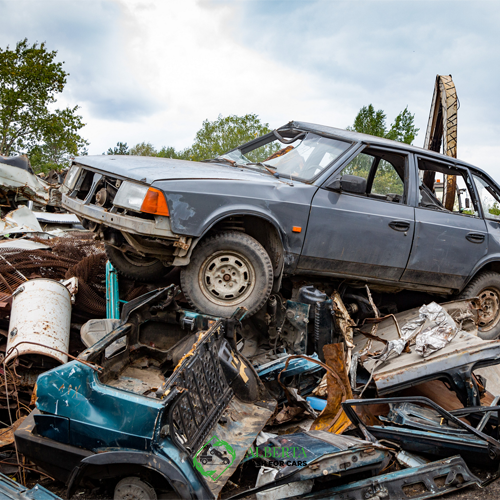
Understanding the Situation
To begin, let’s explore some common scenarios where people may need to scrap a car without keys:
- Abandoned Vehicles: You have an abandoned car on your property, and you’re unsure how it got there or where the keys are.
- Inherited Cars: You’ve inherited a car, but the keys are missing, and the vehicle hasn’t been in use for a long time.
- Old, Non-Operational Cars: Your car has reached the end of its usable life, and the keys have been misplaced or lost.
Reasons for Missing Car Keys
Understanding why your car keys are missing is the first step in dealing with this situation. Some common reasons include:
- Misplacement of keys over time.
- Handing down or inheriting a vehicle without receiving the keys.
- Discovering an abandoned vehicle with no keys.
Why Titles Get Missing
More commonly in used car deals, titles do not exchange hands due to oversight or misleading assurances. Verbal guarantees suffice during peer exchanges among acquaintances but lack legal standing later. Duplicate titles also never get applied by temporary owners envisioning short ownership durations. Vague dealer contracts could also link recurring installment payments to eventual title transfers never realized.
Titles going amiss or getting destroyed after moving residences also disrupts ownership records. Inherited vehicles from relatives may lack proper paperwork too. Some fraudulent sellers also deliberately withhold titles after deals, demanding additional side payments later utilizing coercion. Title lending against vehicles and defaulting also leads to changes in ownership without new buyer awareness.
Reasons You May Need to Scrap a Car Without Keys
There are a few common situations where car owners end up needing to scrap old vehicles without still having the original keys:
- Over time keys can easily be misplaced, lost, or unintentionally thrown away. Many people lack organized systems for storing car keys long-term after vehicles are no longer in regular use. Previous owners may have forgotten to leave keys behind after handing off vehicles.
- In some private sales or inherited vehicles, the previous owner simply never provided you with a set of working keys. They may have kept their only copy or lost it prior to your acquiring the car. This leaves new owners without keys.
- Accidentally locking keys inside the car before it goes to the junkyard is a common scenario. This can happen if keys were left in the ignition at a repair shop or car wash for example. Entry becomes difficult if no spares exist.
- Ignition keys can shear off or break inside the lock cylinder, making it impossible to turn the ignition even if you have spares. Repairing or replacing the ignition cylinder would exceed the car’s value.
In these cases of lost, absent, locked in, or broken keys, owners may relinquish thoughts of selling the cars and seek to at least scrap them – provided it’s possible without keys.
Read Also: How to Tow a Car Without Keys | Fast Method & Techniques
Process of scrap a car without keys
Let’s overview some guide steps for scrapping a car without a title.
Related Post:
Junk Car Without Title or Registration
Determine Ownership
Before scrapping a car without the keys, confirm you have legal authority to dispose of it. Start by researching ownership documentation:
- Review the title or registration to identify the registered owner. Ensure it matches your name.
- Contact any lienholders listed to see if outstanding loan balances exist. You may need to negotiate with lenders before scrapping.
- If the vehicle was inherited, examine estate documentation to establish rightful ownership.
- If not the legal owner, track down the owner to obtain authorization for legally scrapping their vehicle on their behalf.
Resolving ownership gives you full rights to scrap the car.
Assess Vehicle Condition
Since you can’t enter the vehicle, assessing the condition involves exterior-only inspection:
- Look for visible exterior damage like dents, missing parts, rust, and accident repairs that may be deducted from value.
- Estimate mileage and maintenance history based on wear if the odometer isn’t visible. Higher miles reduce offers.
- Consider the cost of gaining entry versus projected scrap value. Damaged interiors may not justify entry costs.
- Note upgrades like alloy wheels or sound systems visible externally that could boost scrapping prices.
This initial condition assessment informs the next steps in determining scrapping value.
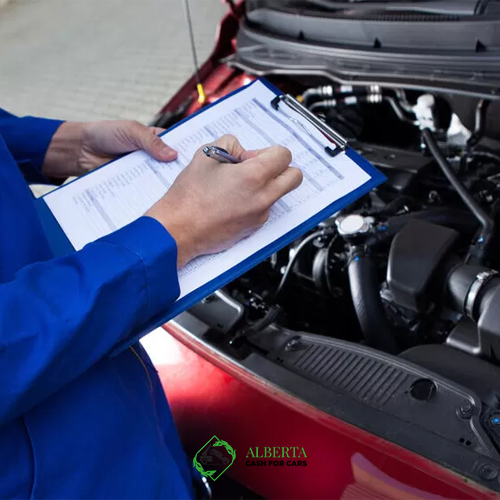
Gain Entry without Keys
To maximize scrapping a car without keys payouts through parts harvesting or improve condition estimates, consider non-destructive entry techniques:
- Manual Entry: A coat hanger or slim Jim tool may trip locks on older vehicles. This risks further damage.
- Locksmith Services: A professional locksmith can create new keys or pick locks. Fees typically run $50-$100.
- Obtain Replacement Keys: The vehicle’s VIN can help order replacement keys from the dealership.
- Towing: As a last resort, if unable to enter, have the vehicle towed to the scrapyard. However, this prevents interior harvesting for higher pricing.
Weigh costs against potential gains when deciding on investing in entry methods.
Removing Valuable Parts Before Scrapping
Stripping parts prior to scrapping a car without keys helps recover additional value:
- Remove intact wheels, hubcaps, mirrors, doors, seats, stereos, and other easily removable parts that have resale value on the used market.
- Extract any aftermarket performance parts, electronics or components added to the car that are still functional. Aftermarket parts sell for higher margins.
- For catalytic converters, carefully cut and detach the whole converter containing precious platinum metals, commanding scrapyard prices 10-20 times higher than scrap steel.
- Drain and capture all fluids, including antifreeze, motor oil, transmission fluid, brake fluid, and air conditioning refrigerant, to be sustainably recycled or disposed of, preventing environmental hazards.
- Utilize proper tools and precautions when stripping parts to avoid injury and follow best practices for handling automotive fluids and gases.
Strategically removing valuable parts maximizes profit versus directly scrapping the whole vehicle before end-of-life recycling.
Related Post:
How to Sell Car for Parts in a fast and profitable way
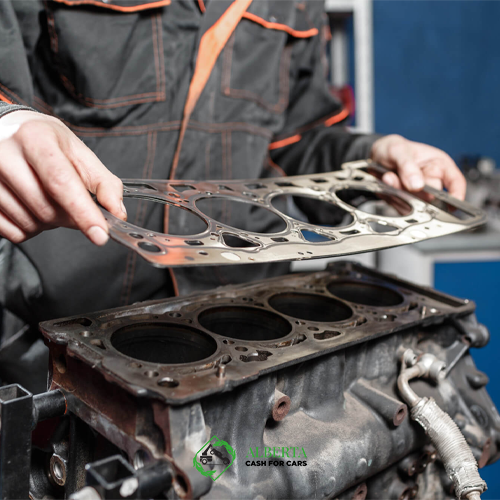
Title Transfer Requirements When Scrapping
Legal title transfer during scrapping a car without keys involves:
- Endorsing the title over to the salvage facility upon vehicle sale for scrap. The junkyard then assumes ownership for dismantling and recycling.
- Following state DMV procedures for notification and surrender of the title once a vehicle is sold to a scrapyard to be scrapped. This transfers legal ownership from the registrant.
- In some states, obtaining a salvaged title prior to scrapping may be required if the car was deemed repairable versus destroyed. Cars rebuilt after salvage keep the branded title.
- Proper title transfer legally absolves the previous owner of liability for any incidents arising from improper vehicle disposal once ownership transfers to the scrapping business.
- For vehicles without a title, a bill of sale indicating parts or full car sale for scrap provides record of legal right to scrap. Photo ID confirmation is also typical.
Proving Ownership Without Title
Before initiating any car disposal without title procedures, gather and organize substantial evidence establishing ownership despite missing titles. Payment receipts, insurance records, license plates, and old registration cards all help validate possession history. Referring to DMV databases using the Vehicle Identification Number could show registered owners. Used car history reports from providers like Carfax tracing records across 20 states also reveal all title exchange incidents proving succession.
Risks of Driving Without Title
Prudently avoid driving or using vehicles lacking proper titling papers since law enforcement agencies can confiscate untitled cars lacking insurance or perceived stolen. Also risks huge cracks in insurance claims, rental coverage etc. with invalid policy documents. If car disposal without title is not an option, Protect yourself by garage parking untitled vehicles until resolving documentation. Declare status upfront when insuring to avoid fraud accusations later.
Receiving a Certificate of Destruction
Upon successful completion of the scrap a car without keys, car owners are typically issued a Certificate of Destruction (COD). This legal document signifies the official end of the vehicle’s life and provides protection against future liabilities associated with the scrapped vehicle. This section outlines the significance of the COD, its legal implications, and the importance of keeping it on record. Understanding the role of this certificate adds a layer of accountability to the scrapping process, assuring car owners that their non-operational vehicle has been responsibly and officially retired from the road.
Scrap Yard Policies on Accepting Vehicles Without Keys
To answer can I scrap my car without keys is, many auto salvage and scrap yards are willing to accept old vehicles without keys provided you supply proper documentation. However, policies can vary between yards regarding cars without keys:
- Some yards happily take cars with no keys every day and all documentation showing you own it. Others may request additional proof like recent registration history.
- Yards may charge a small additional fee for cars without keys to cover extra time and labor involved. Keyless cars may get slightly reduced offers as well.
- If any lien still exists on the vehicle’s title, a yard cannot legally accept it until the lien is released – even with paperwork from the owner.
- Reputable yards will always verify ownership documentation closely to avoid assisting with disposal of stolen vehicles. They run VIN numbers through databases of stolen car reports as well.
Call ahead to confirm a yard’s specific policies around scrapping or salvaging vehicles without keys. Providing thorough documentation minimizes any hassles.
Maximizing Value through Salvageable Parts
While the primary focus of scrapping a non-operational vehicle is often on the metal value, this section explores the potential for maximizing returns through salvageable parts. From functional components like the engine and transmission to smaller items such as lights and interior features, various parts can hold value in the second-hand market. Guidance on identifying, removing, and selling salvageable parts provides car owners with an additional avenue for recouping some of the investment made in the vehicle.
Legalities of Scrapping an Inoperable Vehicle
Navigating regulations around scrapping inoperable vehicles includes:
- Transferring Title: Endorsing the title over to the scrapyard legally relinquishes ownership. Requirements vary by state if no title exists.
- Private Property Regulations: Local ordinances may prohibit keeping derelict vehicles on private land. Scrapping removes violation risks.
- Environmental Rules: Safely removing and disposing of hazardous automotive fluids before scrapping helps avoid EPA violations.
- Selling Without Title: Some scrap yards purchase old vehicles without titles for reduced offers after presenting photo ID and bill of sale.
Consult federal EPA, state DMV, and local ordinances to ensure legal compliance when scrapping untitled, inoperable vehicles.
Transportation Logistics
Once the decision to scrap a car without keys is made, the logistical challenge of transporting the non-operational vehicle to the scrapyard arises. Whether arranging for towing services or delivering the car personally, this section provides practical insights into navigating transportation logistics. It outlines considerations such as cost, safety, and the convenience of different transport methods. By understanding the various options available, car owners can choose the transportation method that aligns with their preferences and circumstances, ensuring a hassle-free transition of the vehicle to its final destination.
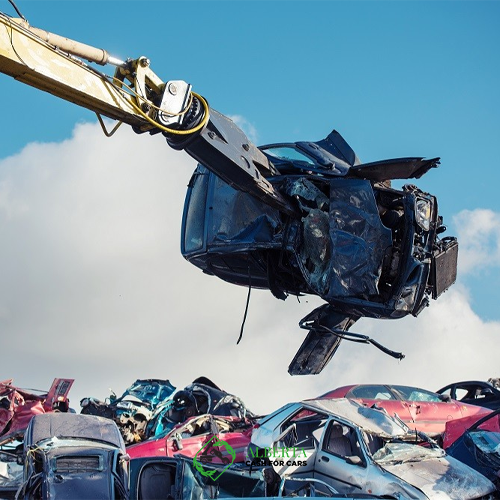
Obtaining Spare Keys or Replacement Keys
When scrapping a car without keys, replacement keys may be obtained through:
- Contacting the vehicle manufacturer and providing the VIN number. The manufacturer can look up the key cut code and create a new key for a fee. This ensures an exact replacement.
- Working with a locksmith to make a duplicate key by decoding the lock cylinders. Skilled locksmiths can create duplicate keys without originals on-site for most vehicle makes and models.
- Check with the car dealership to see if they retained spare keys or key codes when the car was originally purchased. Dealers often keep customer key records on file.
- Using third-party online key replacement services. These services research key codes and create and mail replacement keys using your VIN. Fees are often lower than locksmiths.
- Key programming if obtaining a blank key replacement. Electronic keys must be programmed through procedures specific to each vehicle so the immobilizer system syncs with the embedded key chip. Auto locksmiths perform programming using specialized equipment.
Having properly cut and coded replacement keys allows access to the car to assess mechanical condition and remove valuable parts prior to scrapping.
Troubleshooting Underlying Mechanical Issues
Before assuming a non-starting vehicle only has salvage value, consider assessing and addressing potential mechanical issues:
- Check the battery condition first. Recharge the battery if possible or jump-start it to see if the issue is just a dead battery preventing starting.
- Test for spark, proper fuel pressure, and engine compression. A bad ignition system, clogged fuel filter, or blown head gasket could be simpler fixes than full scrapping.
- Look for leaks, damaged belts, loose wiring connections, and other visible issues that may be quick repairs. Fixing minor leaks or wiring issues can sometimes bring a car back to life.
- Have the vehicle scanned for diagnostic trouble codes if able to access the OBD-II port. Engine computer codes precisely identify mechanical issues.
- Assess the projected repair costs to determine if they are economically justified compared to scrapping value. Minor repairs can warrant fixing, while major issues still make scrapping the better option.
Identifying and resolving basic operational issues before scrapping helps maximize value recovery from the vehicle.
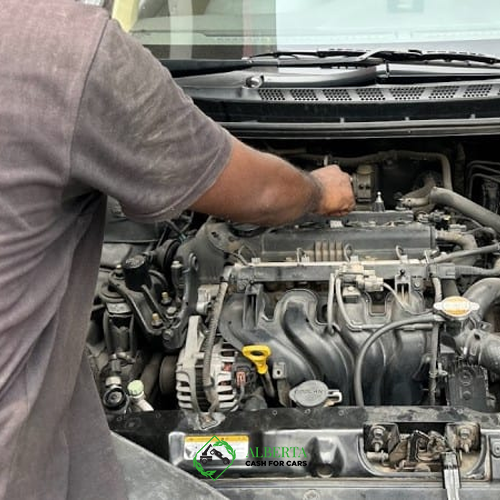
Conclusion for scrap a car without keys
Scrapping old cars no longer operable and to which keys are lost requires special care around ownership verification, legalities, valuation, and access. With diligence to properly transfer titles, follow environmental regulations, maximize observable value, and responsibly handle fluids, owners can effectively process the scrapping a car without keys. The result safely clears space and generates some monetary return in the process

